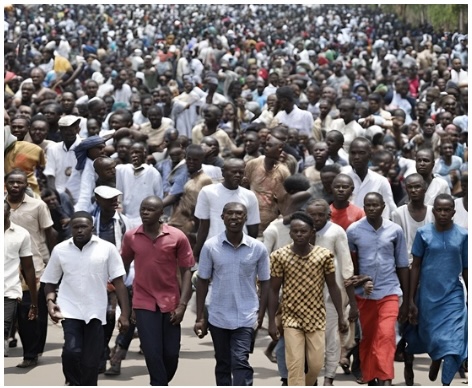Hardship has driven scores of Nigerians into the streets again. Fresh protests starting in Abuja. Protestors demand positive government actions to alleviate ongoing sufferings.
Scores of Nigerians gathered in Abuja on Monday to protest escalating fuel costs and chronic fuel shortages. The demonstration highlighted the mounting economic hardship faced by many citizens. Organized by Abdullahi Bilal from the Two Million Man March Against Oil Scam Cabal, alongside Barrister Napoleon Otache and Olayemi Isaac from Citizens and Economic Freedom Rights Activists in Nigeria (CEFRAN), the protest attracted widespread attention.
Grievances over fuel costs and economic strain
Protesters expressed deep frustrations over skyrocketing fuel prices. Long queues at gas stations have become commonplace, driving inflation higher. Many demonstrators emphasized that these conditions have plunged millions of Nigerians into poverty. They condemned the current fuel subsidy regime, claiming it enriches a select few while the majority struggle with high costs.
Bilal stated, “We demand immediate action to address the failed leadership in managing our oil sector.” The call for full deregulation in the oil industry was a central theme. Protesters believe this will promote transparency, competition, and fairer pricing for fuel.
The importation of adulterated fuel also drew ire from the crowd. Protesters claimed it harms vehicles and businesses alike. They demanded an immediate halt to these corrupt practices, questioning how substandard fuel continues to enter Nigeria despite assurances of quality control.
Unfulfilled promises and ongoing hardship
The demonstrators criticized the unfulfilled promises surrounding the Dangote Refinery. Despite billions spent on refinery development, fuel shortages persist. The protesters highlighted Nigeria’s reliance on costly imports, even as an oil-producing nation.
“This is unacceptable,” one protester declared. “We need accountability from those responsible for our suffering.” The crowd echoed sentiments of frustration and anger over the ongoing economic challenges.
In recent months, Nigeria has seen similar protests. The last was inAugust against “bad leadership.” Some of the protesters, including minors, are currently undergoing trials for treason, among other charges.
Citizens have rallied against police brutality, inflation, and the rising cost of living. The outcry reflects a growing dissatisfaction with government policies and a demand for change.
Government and police response
The Nigerian government responded to the protest with a heavy police presence. Officers monitored the situation closely, aiming to maintain order. As tensions rose, authorities urged demonstrators to remain peaceful.
Government officials have yet to release a detailed statement addressing the protesters’ demands. However, some leaders acknowledged the public’s frustration over ongoing hardship. The lack of immediate action may escalate tensions further, as citizens continue to voice their grievances.
The Abuja protest represents a pivotal moment for Nigerians. It underscores the urgent need for solutions to alleviate the economic hardship affecting countless families. As the situation develops, citizens will watch closely for government responses to their demands for accountability and reform.

Leave feedback about this